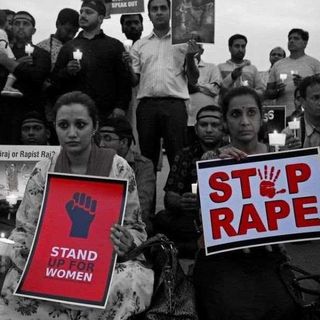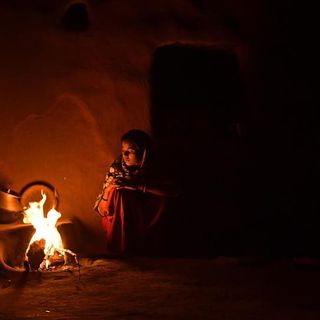“Un Violador en Tu Camino” (A Rapist in Your Path), created by performance collective LasTesis in Valparaíso, Chile, became a symbol of resistance during Chile’s nationwide uprising against the country’s economic and political systems in 2019. Since, it has been translated into multiple languages (from Spanish) and performed in Mexico, France, Spain, the United Kingdom, the United States, and now, India.
Women protesters in Chile perform the “Un Violador en Tu Camino” in Santiago, Chile on Nov. 25, 2019.
Women protesters in Kolkata, mostly from Jadavpur University, translated the song, named it “Dhorshok Tumii,” and performed it — with many women donning a black blindfold over their eyes — in Kolkata’s New Market on Jan. 11 as a demonstration against Prime Minister Narendra Modi’s scheduled visit to the city. Protesters tweaked the Spanish lyrics in Bengali to say, “Nari-r hoye hotath, hotahkari-r shaja hoyna,” which translates to “Women are killed, and the killers aren’t punished.” It was a repeat performance of a Jan. 4 protest, during which the anthem was also sung; a similar demonstration was also held in New Delhi on Dec. 9, 2019.
The original, when translated to English, goes:
Patriarchy is a judge who judges us for being born
and our punishment is the violence you don’t see.
It’s femicide, impunity for my murderer,
it’s disappearance, it’s rape.
And it wasn’t my fault, where I was, or how I dressed.
The rapist is you, the rapist is you.
It’s the police, the judges, the state, the president.
The oppressive state is a macho rapist.
Students singing a Bengali version of the Chilean song, "The Rapist is You" at a protest to oppose Modi's visit to Kolkata. pic.twitter.com/ybVreEg5RO
Women in Kolkata perform the “Un Violador en Tu Camino” in Bengali on Jan. 11, 2020.
“It was never intended to be a protest song – the women of the marches transformed it into something more,” Lastesis member Paula Cometa told The Guardian in December when the song was first taking off. However, the song itself is based on a concept, popularized by Argentinian theorist Rita Segato, that sexual violence against women is not just a social or moral problem; it’s a political issue.
In India, however, the song has been adapted to rally against a larger political issue — the National Register of Citizens and the Citizenship Amendment Act, which if combined have the power to strip many minority communities in India of their citizenship. The image of women being comfortable protesting in public spaces has served as an indicator of growing consciousness among women from all strata of society regarding issues pertaining to them — be it related to class, caste, religion or gender — signaling they will not be keeping quiet any more. In Shaheen Bagh in Delhi, for example, Muslim women from predominantly disadvantaged socio-economic classes have carried out a sit-in for almost a month, braving cold weather and law enforcement attempting to break them up. Emulating their example, women across the country — from Kolkata’s Park Circus to Gaya’s Shanti Bagh in Bihar — have carried out sit-ins in protest, giving the rest of India the same powerful visual of a sea of peaceful women refusing to budge.
As told by a Kolkata protester to Scroll: “We wanted to highlight the patriarchal violence that Modi’s idea of a Hindu Rashtra represents.” Here, Indian protesters have elevated the focus of “The Rapist In Your Path” from sexual violence against women to a masculinized form of oppression being dealt to India’s minority communities.
Related on The Swaddle:
In Shaheen Bagh, Muslim Women Redefine Care Work as Resistance
Even outside of the current political turmoil, the Chilean anti-rape anthem is relevant in India, after the country has been wracked with gory, violent rape-murders of women as young as 8 years old, with legal recourse lagging far behind vigilante justice. In India, sexual violence against women is still not being framed amid a larger conversation of rape culture; rape is still believed to be perpetrated by a lust-crazy monster, in a one-off moment of insanity provoked by the woman having led the rapist on with her words, clothes or expressions. It’s high-time then, that a powerful feminist anthem paints the picture of loud, defiant women foregoing the silencing promoted by rape culture and unequivocally challenging those in power in India — as women in New York City demonstrated outside the courtroom where serial rapist Harvey Weinstein was undergoing a criminal trial for sex crimes.
The song’s global appeal, Ph.D. researcher Athanasia Francis writes for The Conversation, lies in the “the shared realities of violence as experienced by women and marginalized groups around the world.” She adds, “The message I see in this song is alarmingly similar to what I’ve witnessed in other protests: ‘This is a war.'”




